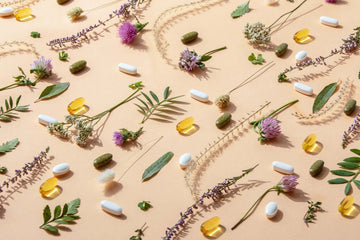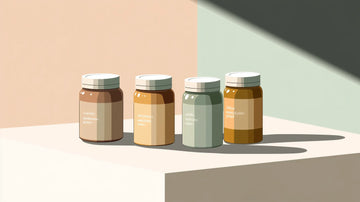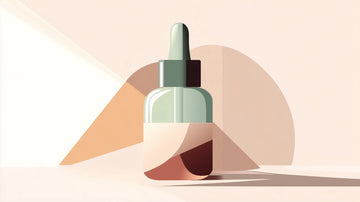Did you know that up to 90% of skin aging is caused by UV rays? Collagen, an essential protein for the skin, bones, and muscles, begins to decline in your twenties and can be severely affected by exposure to UV and chemicals. Here is what you need to know to protect your collagen:
-
Deterioration factors:
- UVA (315–400 nm) : Accelerated skin aging.
- Free radicals (ROS): Degradation of dermal proteins.
- Harmful chemicals: Endocrine disruptors, heavy metals, pesticides.
-
Protective power supply:
- Eat protein-rich foods (fish, poultry).
- Add vitamin C (citrus fruits, spinach) and minerals (zinc, copper).
-
Key habits:
- Apply sunscreen daily.
- Limit your exposure to pollutants and chemicals.
- Get enough sleep and adopt a healthy routine.
Quick summary: Collagen is vital for the structure and firmness of your skin. Protect it by combining a proper diet, UV care, and daily practices to limit harmful exposures.
Is collagen supplement a SCAM? The truth about collagen powder and firmer skin
Functions of Collagen in Human Health
To better understand the impact of chemical exposures on the body, it is useful to examine the crucial role of collagen in our body.
Collagen: A Structural Protein
Collagen acts as a true framework for the body. In the skin, it makes up about 75% of its structure. It is found in several tissues where it ensures strength and flexibility. Here is an overview of its main functions:
| Fabric | Role of Collagen |
|---|---|
| Skin | Maintaining elasticity and firmness |
| The | Solidity and Resistance |
| Tendons | Support and Flexibility |
| blood vessels | Elasticity and structure |
| cornea | Protection and transparency |
Why is Collagen Essential?
Collagen plays a key role in maintaining overall health. However, its production begins to decrease as early as your twenties. In women, a marked decrease of about 30% occurs within the five years following menopause.
To maintain adequate collagen levels, here are three important levers:
- Consume protein-rich foods: Include poultry, fish, eggs, dairy products, and legumes in your diet.
- Providing vitamin C : Citrus fruits, red peppers, and spinach are essential for stimulating collagen production.
- Include minerals such as zinc and copper: They are found in lean meats, nuts, and whole grains.
At the same time, it is crucial to limit the degradation of existing collagen. Did you know that up to 90% of skin aging is caused by UV rays? Daily sun protection is therefore essential to preserve collagen and slow down the effects of aging.
Chemical Exposure and Collagen Damage
Exposure to certain chemical substances can seriously affect the structure and function of collagen. Better understanding these risks can help adopt effective protective measures for this key protein.
Hazardous Chemical Substances
Some chemicals, notably endocrine disruptors, represent a direct threat to collagen. Here are a few examples to be aware of:
| Category | Examples | Effects on Collagen |
|---|---|---|
| Food contact materials | Bisphenol A | Alteration of the structure |
| Cosmetic products | diethyl phthalate (DEP) | Reduction in production |
| Pesticides | Atrazine (ATR) | Increased inflammation |
| Heavy metals | Arsenic, lead, mercury | Accelerated degradation |
Impact of Chemical Products on Collagen
The chemicals identified above harm collagen in several ways. Endocrine disruptors, for example, increase inflammation and oxidative stress, which weakens the collagen structure. Oxidizing chemicals accelerate its degradation, limit fiber repair, and exacerbate existing inflammation. Furthermore, AGEs (advanced glycation end-products) stiffen the collagen and hinder its regenerative capacity.
Limit Exposure to Harmful Substances
To protect collagen, it is important to reduce daily exposure to these chemicals. Here are some practical tips:
Daily protection:
- Use a broad-spectrum sunscreen.
- Wear covering clothing and sunglasses.
Food and utensils:
- Prioritize organic foods.
- Replace plastic containers with glass or stainless steel.
- Filter the drinking water.
Indoor air quality:
- Regularly ventilate the living areas.
- Choose natural cleaning products.
These simple measures can help minimize the effects of chemicals on collagen, while preserving its quality and quantity in the body.
Menopause and Collagen: Protection Methods
Effects of Menopause on Collagen
Menopause, usually around 51 years, causes a marked decrease in collagen production. As explained by Dr. Julia Marie Mhlaba, dermatologist at Northwestern Medicine:
There is a decrease in both collagen and elastin in the skin. The reduction of collagen and elastin can lead to thinning, wrinkling, and sagging of the skin.
The statistics are striking: up to 30% of collagen is lost in the first five years after menopause, and then approximately 2% disappears each year. This rapid loss affects not only the appearance of the skin but also its ability to regenerate. To slow these effects, the use of supplements can be an effective solution.
Natural Supplementation Options
| Supplement Type | Benefits | Recommended Dosage |
|---|---|---|
| Hydrolyzed Collagen | Promotes skin elasticity and hydration | 2.5-10g per day |
| Vitamin C | Stimulates the natural production of collagen | 500-1000mg per day |
| Zinc | Supports collagen synthesis | 8-11mg per day |
Les Laboratoires üma offer products such as Iconique Collagène®, a natural, hormone-free alternative designed specifically for menopausal women.
Daily Habits to Preserve Collagen
In addition to supplements, simple daily routines can protect collagen. Dr. Mar Mira, from Clínica Mira + Cueto, warns:
Ultraviolet radiation affects collagen production in the skin, due to the oxidation produced by UV rays which accelerates the destruction of collagen and decreases its production.
Protect your skin:
- Apply broad-spectrum sunscreen every day
- Choose fragrance-free moisturizers
- Avoid prolonged sun exposure, especially between 10 a.m. and 4 p.m.
Eat smartly:
- Favor foods rich in proteins (fish, poultry, legumes)
- Add fruits and vegetables rich in vitamin C to your diet
- Consume zinc-rich foods (seafood, nuts, seeds)
Adopt a healthy lifestyle:
- Sleep between 7 and 9 hours per night
- Engage in regular physical activity
- Reducing stress through techniques such as meditation or yoga
- Limit alcohol and stop smoking
Conclusion: Long-Term Collagen Protection
To preserve collagen in the long term, it is essential to combine several complementary approaches. Here are the three main pillars:
External Protection
- Use daily sunscreen to limit damage caused by UV.
- Wear clothing with UPF 50+ protection.
- Reduce exposure to outdoor pollutants.
This initial defense must be reinforced by an appropriate diet.
Targeted Nutrition
Adopting a balanced diet, such as the Mediterranean diet, can support the natural production of collagen. Here are some key nutrients:
| Nourishment | Food Sources | Benefits |
|---|---|---|
| Copper | Seafood, mushrooms | Contributes to collagen production |
| Vitamin C | Citrus fruits, kiwi, beetroot | Promotes collagen synthesis |
| Carotenoids | Orange vegetables, spinach | Offers antioxidant protection |
A diet rich in these elements helps maximize the benefits of other protective measures.
Protective Lifestyle
With menopause, collagen loss can reach 2% per year. Certain habits can slow down this process:
- Getting enough sleep to allow the skin to regenerate.
- Practice regular physical activity.
- Avoid harmful factors such as tobacco and alcohol.
In addition, the natural solutions provided by Laboratoires üma can offer valuable support during this critical period.
Collagen prevents the skin from sagging and gives it its youthfulness.
By adopting these long-term strategies, it becomes possible to preserve collagen and its benefits for the skin and the body.






